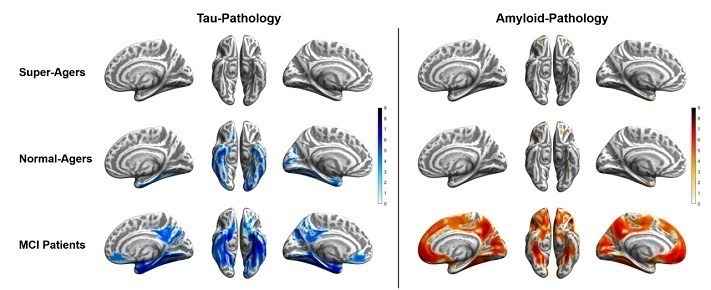Brain scans show lower accumulation of tau and amyloid pathology among cognitive “super-agers”

– Tau (blue) and amyloid (orange) distribution patterns for super-agers, normal-agers and MCI patients, when compared to a group of younger, healthy, cognitively normal, amyloid-negative individuals. Credit: Merle C. Hoenig.
Super-Agers Show Resistance to Tau and Amyloid Accumulation, Maintain High Cognitive Function (Society of Nuclear Medicine and Molecular Imaging press release):
Super-agers, or individuals whose cognitive skills are above the norm even at an advanced age, have been found to have increased resistance to tau and amyloid proteins, according to research presented at the Society of Nuclear Medicine and Molecular Imaging (SNMMI) 2020 Annual Meeting. An analysis of positron emission tomography (PET) scans has shown that compared to normal-agers and those with mild cognitive impairment, super-agers have a lower burden of tau and amyloid pathology associated with neurodegeneration, which probably allows them to maintain their cognitive performance. An image showing the comparison of tau and amyloid distribution patterns in these different cognitive aging trajectories has been selected as SNMMI’s 2020 Image of the Year.
“Our cognition reflects who we are as individuals. As we age, most of us lose some of that ability,” said SNMMI’s Scientific Program Committee chair, Umar Mahmood, MD, PhD. “The Image of the Year provides us with insight into how we can use these PET imaging biomarkers to understand behaviors and therapies that may allow more of us age better and retain more of our cognitive abilities as we get older” …
Data from the Alzheimer’s Disease Neuroimaging Initiative was utilized to create three age- and education-matched groups of 25 super-agers, 25 normal-agers and 25 patients with mild cognitive impairment, all above 80 years old. In addition, 18 younger, cognitively normal, amyloid-negative controls were included in the comparison as a reference group.
The Study:
Resistance to Tau and Amyloid Pathology Facilitates Super-Aging (The Journal of Nuclear Medicine). From the abstract:
- Objectives: The phenomenon of selected individuals cognitively performing above the norm even at high age (so-called super-agers) suggests that these individuals must obtain extraordinary resistance mechanisms against brain aging processes and/or neurodegeneration. However, not much is known about age-associated molecular hallmarks of neurodegeneration in super-agers, particularly concerning proteinopathies such as the accumulation of amyloid-? and tau. Therefore, we compared the intracerebral amyloid and tau burden in vivo in a group of super-agers (SA), normal-agers (NA) and patients with mild cognitive impairment (MCI) using PET imaging.
- Results: No significant differences between SA and YA (note: Younger Age control group) were observed in terms of in vivo tau and amyloid burden. The NA group exhibited higher tau burden in inferior temporal and precuneal areas and no significant differences in amyloid burden, when compared to the YA group. The MCI patients showed both high amyloid and tau pathology burden. Differences in amyloid burden predicted NA from MCI, whereas lower tau burden and lower polygenic risk predicted SA from MCI.
- Conclusions: The phenomenon of super-aging appears to be associated with the resistance to tau and amyloid pathology, which likely permits maintenance of cognitive performance despite advanced age. In turn, differences between normal aging and MCI appear to be driven by the level of amyloid burden. These results motivate further research to determine responsible resistance factors, which may also inspire the development of novel treatment concepts.
The Study in Context:
- Reminder: A brain-friendly lifestyle is the best approach to delay cognitive decline and dementia
- Cognitive training, diet, exercise, and vascular management seen to improve cognition even in people with genetic predisposition for dementia (APOE e4)
- Report: 35% of worldwide dementia cases could be prevented by modifying these 9 modifiable risk factors
- Repetitive negative thinking may increase (or perhaps be caused by) cognitive decline and Alzheimer’s pathology


